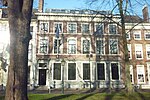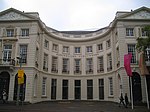The Supreme Court of the Netherlands (Dutch: Hoge Raad der Nederlanden [ˈɦoːɣə raːdər ˈneːdərlɑndə(n)] or simply Hoge Raad), officially the High Council of the Netherlands, is the final court of appeal in civil, criminal and tax cases in the Netherlands, including Curaçao, Sint Maarten and Aruba. The Court was established on 1 October 1838 and is located in The Hague.The Supreme Court rules civil and criminal matters. In certain administrative cases it has final jurisdiction as well, while in other cases this jurisdiction rests with the adjudicative division of the Council of State (Raad van State), the Central Appeals Tribunal (Centrale Raad van Beroep), the Trade and Industry Appeals Tribunal (College van Beroep van het bedrijfsleven) as well as judicial institutions in the Caribbean part of the Kingdom of the Netherlands. The Court is a court of cassation, which means that it has the competence to quash or affirm rulings of lower courts, but no competence to re-examine or question the facts. It only considers whether the lower courts applied the law correctly and the rulings have sufficient reasoning. In so doing it establishes case law.
As the government of the Netherlands is characterised by parliamentary sovereignty, the Supreme Court cannot overturn primary legislation made by the States-General. This is laid out in Article 120 of the Constitution, which states that courts may not rule on the constitutionality of laws passed by the States General and treaties. With the exception of the Constitutional Court of Sint Maarten (which rules on constitutionality with regards to the Sint Maarten constitution only) courts thus have little competence for judicial review with respect to the Constitution. However, it is possible for courts (including the Supreme Court) to overturn secondary legislation made by the executive government.
The Supreme Court currently consists of 36 judges: a president, six vice presidents, twenty-five justices (raadsheren, literally "Lords of the Council") and four justices extraordinary (buitengewone dienst). All judges are appointed for life, until they retire at their own request or mandatorily on their 70th birthday.











